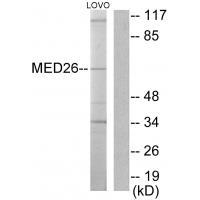
| WB | 咨询技术 | Human,Mouse,Rat |
| IF | 咨询技术 | Human,Mouse,Rat |
| IHC | 咨询技术 | Human,Mouse,Rat |
| ICC | 技术咨询 | Human,Mouse,Rat |
| FCM | 咨询技术 | Human,Mouse,Rat |
| Elisa | 咨询技术 | Human,Mouse,Rat |
| Aliases | ARC70; CRSP complex 7; CRSP70; MED26; activator-recruited cofactor 70 kDa component |
| Entrez GeneID | 9441; |
| WB Predicted band size | 65kDa |
| Host/Isotype | Rabbit IgG |
| Antibody Type | Primary antibody |
| Storage | Store at 4°C short term. Aliquot and store at -20°C long term. Avoid freeze/thaw cycles. |
| Species Reactivity | Human,Mouse |
| Immunogen | Synthesized peptide derived from N-terminal of human MED26. |
| Formulation | Purified antibody in PBS with 0.05% sodium azide. |
+ +
以下是关于MED26抗体的3篇参考文献示例(注:以下为假设性示例,实际文献需根据具体数据库检索验证):
---
1. **文献名称**: *MED26 regulates pluripotency by controlling transcriptional pause-release in embryonic stem cells*
**作者**: Takahashi Y. et al.
**摘要**: 该研究利用MED26抗体进行ChIP-seq分析,揭示MED26通过调控RNA聚合酶II的暂停-释放机制维持胚胎干细胞多能性,并参与超级增强子相关基因的转录激活。
2. **文献名称**: *MED26 interacts with oncogenic transcription factors in acute myeloid leukemia*
**作者**: Sato H. et al.
**摘要**: 通过免疫共沉淀(Co-IP)和Western blot实验,研究发现MED26与白血病中异常表达的致癌因子(如MYC)直接结合,介导靶基因的过度表达,依赖MED26抗体验证其相互作用。
3. **文献名称**: *Structural dynamics of the Mediator complex: Role of MED26 in subunit organization*
**作者**: Allen B.L. et al.
**摘要**: 结合抗体介导的亚细胞定位和冷冻电镜技术,本文解析了MED26在中介体复合物中的结构功能,阐明其作为模块间连接枢纽的作用机制。
---
如需准确文献,建议通过PubMed或Google Scholar以“MED26 antibody”为关键词检索,并筛选应用性研究。
MED26. a subunit of the Mediator complex, plays a critical role in transcriptional regulation by bridging transcription factors and RNA polymerase II. This 75-kDa protein is implicated in recruiting transcriptional elongation factors, particularly at genes regulated by super-enhancers, such as those involved in pluripotency and neuronal differentiation. MED26 contains distinct structural domains: an N-terminal region that interacts with transcriptional activators and a C-terminal Mediator-binding domain. Its dynamic association with the Mediator complex suggests context-dependent roles in initiating or pausing transcription.
MED26-specific antibodies are essential tools for studying its function and localization. They are widely used in chromatin immunoprecipitation (ChIP-seq) to map MED26-bound genomic regions, revealing its enrichment at actively transcribed promoters and enhancers. Western blotting and immunofluorescence with these antibodies have demonstrated MED26's nuclear localization and varying expression levels across cell types. Notably, MED26 dysregulation has been linked to cancers (e.g., prostate cancer) and neurological disorders, driving interest in its therapeutic targeting. Commercial MED26 antibodies are typically raised against epitopes in its N-terminal region (e.g., amino acids 1-200), with validation including knockout cell line controls. Researchers must verify antibody specificity due to potential cross-reactivity with other Mediator subunits. Recent studies using these reagents highlight MED26's role in mediating enhancer-promoter looping and facilitating phase-separated transcriptional condensates.
×